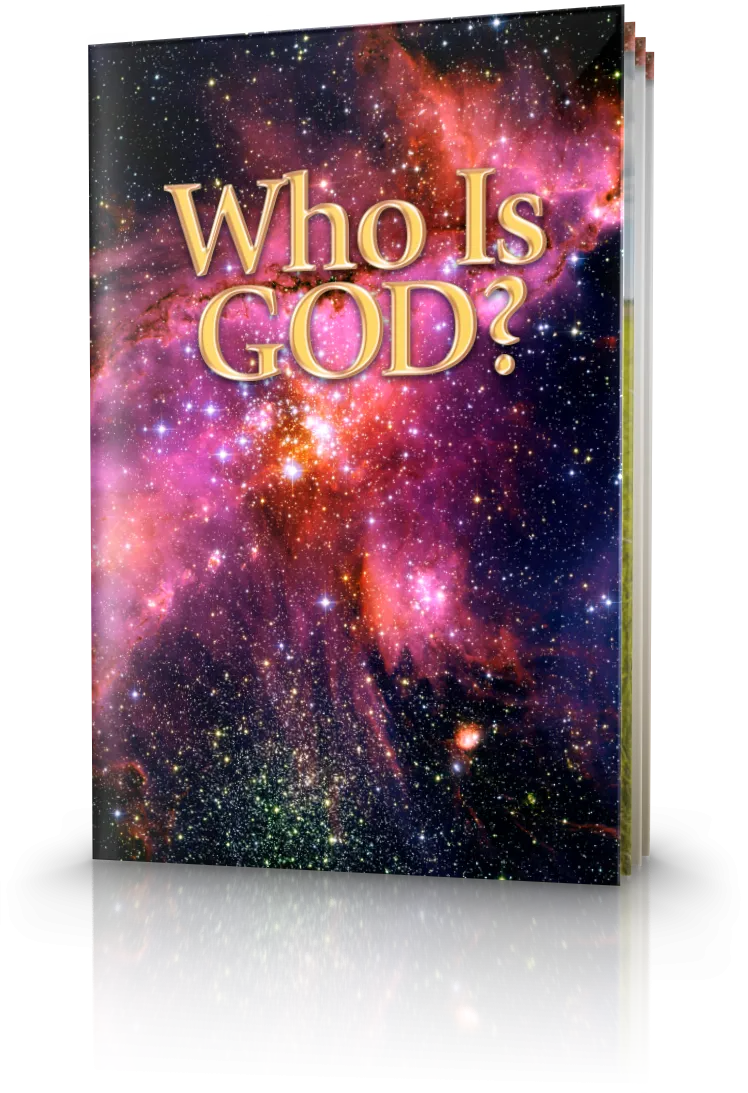The Personal Nature of God

Has God always existed? If not, who created God? Is God one person, two or three? What did Jesus reveal to us about the nature of God when He continually referred to a being He called the Father? The answers will become evident as we progress through the Scriptures.
The first major point we need to understand is that, as stated earlier, God reveals Himself through His Word. The Creator wants men and women to understand Him as He reveals Himself in the Holy Scriptures. It's important that we carefully consider this truth.
In the Bible's first book we find a vital point regarding God's nature. Genesis 1 records many creative acts of God before He created mankind. But notice Genesis 1:26: "Then God said, 'Let Us make man in Our image, according to Our likeness.'"
The One who became Jesus Christ, declared to be on the same plane of existence as God the Father, was born as a human being and perceived by and through the physical senses of human beings.
Nowhere in the previous verses of Genesis did God use this phrase, "Let Us . . ." Why does Genesis now use this plural expression? Why have Bible translators down through the centuries understood that the plural was necessary in this verse?
Who is the Us mentioned here, and why is the plural Our also used twice in this sentence? Throughout the first chapter of Genesis the Hebrew word translated "God" is Elohim, a plural noun denoting more than one entity. Why did our Creator purposefully use these plural expressions? Is God more than one person? Who and what is He? How can we understand?
The Bible interprets the Bible
One of the most fundamental principles to keep in mind regarding proper understanding of God's Word is simply this: The Bible interprets the Bible. We often must look elsewhere in the Scriptures to see more light regarding the meaning of a particular passage. The New Testament sheds much light on the Old, and vice versa.
We can understand Genesis 1:26 much better in the light of some of the writings of the apostle John. He begins his biography of Jesus Christ by stating: "In the beginning was the Word, and the Word was with God, and the Word was God. He was in the beginning with God. All things were made through Him, and without Him nothing was made that was made" (John 1:1-3).
If you are with someone, then you are other than and distinct from that person. John clearly describes two divine beings in this passage.
In one sense we could refer to John 1:1 as the real beginning of the Bible. It describes the nature of God as Creator even before the beginning depicted in Genesis 1:1. As The New Bible Commentary: Revised states, "John's distinctive contribution is to show that before the Creation the Word existed" (1970, p. 930).
Consider carefully the context of this crucial chapter of John. John 1:14 explains exactly who this Word actually became: "And the Word became flesh and dwelt among us, and we beheld His glory, the glory as of the only begotten of the Father, full of grace and truth." The Word was conceived in the flesh as a physical human being—Jesus Christ. Although fully human, Christ perfectly reflected God's divine character.
The Word of life
Here, then, we have two great personages, two uncreated, eternal beings—God and the Word, both divine—presiding over the creation. As the late British theologian F.F. Bruce commented on the opening passages of the Gospel of John: "The Personal Word is uncreated, not only enjoying the divine companionship, but sharing the divine essence" (The Message of the New Testament, 1972, p. 105). This Word was and is God along with the Father.
Later, in his first epistle, John adds to our understanding: "That which was from the beginning, which we have heard, which we have seen with our eyes, which we have looked at and our hands have touched—this we proclaim concerning the Word of life" (1 John 1:1, New International Version). Here that same "Word" (Jesus Christ) of John's Gospel account is called "the Word of life."
It's easy to overlook the importance of this crucial verse and read right over its enormous significance. The One who became Jesus Christ, declared to be on the same plane of existence as God the Father, was born as a human being and perceived by and through the physical senses of human beings—particularly
of His early inner core of disciples, including the one who wrote these words, John. These men became Christ's apostles—His emissaries—and were special witnesses of His resurrection.
John wrote that the Word, who was with God from the beginning, lived among them in the human flesh. Although He was born a physical human being, the disciples actually saw, touched, conversed with and listened to One who was, as will become increasingly clearer, a member of the divine family.
John continues: "The life appeared; we have seen it and testify to it, and we proclaim to you the eternal life, which was with the Father and has appeared to us" (1 John 1:2, NIV). "The Word of life" in 1 John 1:1 is called "the eternal life" in 1 John 1:2.
John goes on to say: "We proclaim to you what we have seen and heard, so that you also may have fellowship with us. And our fellowship is with the Father and with his Son, Jesus Christ" (1 John 1:3, NIV). The Holy Scriptures reveal that God the Father and Jesus Christ form a divine family.
They have a distinct and loving family relationship. Addressing the Father, Jesus said, "You loved me before the world began" (John 17:24, REB). He refers here not to our limited human love but to the divine love of the heavenly realm.
Christ the Creator
Not only did the apostle John write the fourth Gospel account and three epistles preserved in the New Testament, but he also penned the book of Revelation. It was here, in the message to the seven churches of Revelation, that Jesus clearly identified Himself as the beginner or source of God's creation. "These are the words of the Amen, the faithful and true witness, the source of God's creation" (Revelation 3:14, REB).
Jesus not only died for our sins so we could be reconciled to the Father, but He is our Creator. The apostle Paul plainly tells us that "God . . . created all things through Jesus Christ" (Ephesians 3:9).
In Colossians 1:16 Paul further writes: "For by Him [Christ] all things were created that are in heaven and that are on earth, visible and invisible, whether thrones or dominions or principalities or powers. All things were created through Him and for Him."
This passage is all-encompassing. Jesus created "all things ... that are in heaven"—the entire angelic kingdom, which includes an innumerable number of angels—and the whole universe, including planet earth. Many people do not grasp the clear biblical fact that Jesus Christ is our Creator!
The book of Hebrews affirms this wonderful truth as well, stating that God the Father "has in these last days spoken to us by His Son, whom He has appointed heir of all things, through whom also He made the worlds" (Hebrews 1:2). The abundant witness of the New Testament Scriptures shows that God the Father created everything through the Word—the One who later became Jesus Christ. Thus, both divine beings were intimately involved in the creation.
The book of Hebrews presents Christ as the being through whom the Father brought the world of space and time into existence, and who "sustain[s] all things by his powerful word" (Hebrews 1:3, NRSV). Scripture, therefore, reveals that Jesus not only created the universe, but He also sustains it.
Submission to the Father
However, Jesus was willing to voluntarily surrender His godly power and position for our sakes. The apostle Paul tells us: "Your attitude should be the same as that of Christ Jesus: who, being in very nature God, did not consider equality with God something to be grasped [i.e., not let go of], but made himself nothing, taking the very nature of a servant, being made in human likeness. And being found in appearance as a man, he humbled himself and became obedient to death—even death on a cross!" (Philippians 2:5-8, NIV).
After Jesus had been sacrificed for our sins and then restored to eternal life, He "sat down at the right hand of the Majesty on high [that is, the Father]" (Hebrews 1:3). After He had directly experienced what it was like to be a flesh-and-blood human being, Christ returned to the Father's throne—His previous habitation throughout all past eternity.
Remember His words just before His impending death and resurrection: "And now, O Father, glorify Me together with Yourself, with the glory which I had with You before the world was" (John 17:5). In this passage Jesus talks of a time even before the creation account of Genesis 1:1, when these two divine beings were together.
Of course, then and always, the Father is supreme. Christ's equality with the Father is in the sense of sharing the same level of existence, both of them being God. It does not mean, as some maintain, that the two are equal in authority—for Scripture clearly shows that Christ is subordinate to the Father.
The 15th chapter of 1 Corinthians is often rightly called the resurrection chapter. It tells us that everyone in God's future Kingdom will be subject to Christ, the Father being the only exception: "It is evident that He [the Father] who put all things under Him [the Son] is excepted. Now when all things are made subject to Him, then the Son Himself will also be subject to Him who put all things under Him, that God may be all in all" (1 Corinthians 15:27-28).
Earlier in 1 Corinthians, Paul clearly states that "the head of Christ is God" ( 1 Corinthians 11:3). In both passages Paul describes two individual divine beings, with Jesus being subject to God the Father. In fact, Christ Himself said, "My Father is greater than I" (John 14:28) and "My Father ... is greater than all" (John 10:29). God the Father is thus the undisputed Head of the family.





